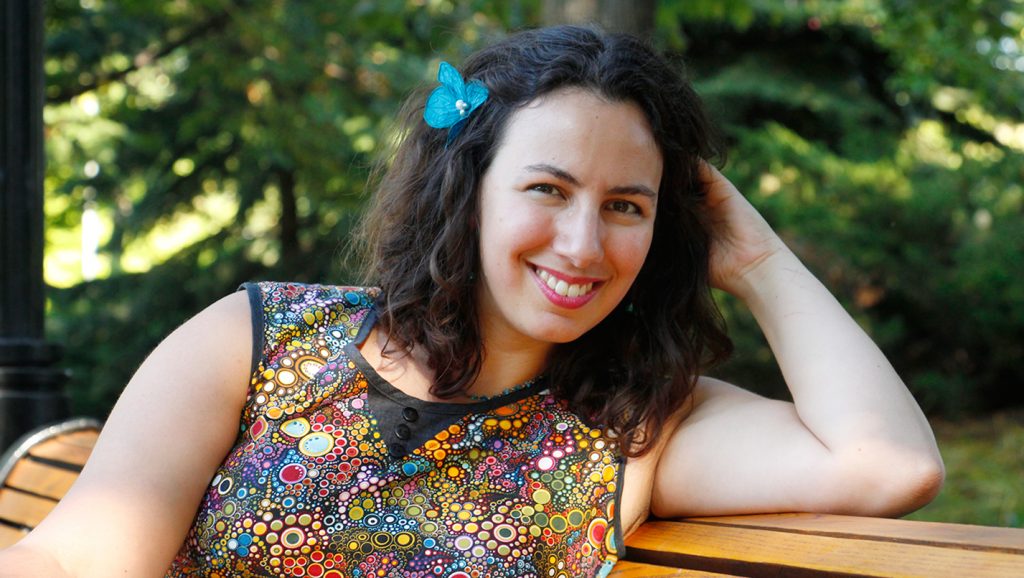Centretown author a finalist in World Fantasy Awards
By Matthew Horwood
Centretown sci-fi author Amal El-Mohtar is in the spotlight again for her short story Seasons of Glass and Iron after winning an international Hugo Award and becoming a finalist in the 2017 World Fantasy Awards.
Seasons of Glass and Iron is a fantasy story about the friendship between two women who are both trapped in their own fairy tales. The idea for Seasons of Glass and Iron came to El-Mohtar when her six-year-old niece, Lara, asked her to tell a story to pass the time during a long car ride.
“I realized that all of the fairy tales that came to mind were ones where girls were being rescued or being horrible to each other,” El-Mohtar explained, referencing the dashing princes and evil step-sisters of many traditional stories for children. “So I felt the desire to tell her a story where girls rescue each other and become friends.”
In May 2016, El-Mohtar’s story won a Nebula Award for best sci-fi story, a top honour from the Science Fiction and Fantasy Writers of America. In June of this year, the story earned a Locus literary prize from the science fiction and fantasy magazine Locus.
Now the author is a finalist in the 2017 World Fantasy Awards, set to take place in San Antonio, Texas in November.
El-Mohtar won her Hugo — one of the world’s most prestigious sci-fi prizes — in early August. The awards ceremony was held in Helinski, Finland.
El-Mohtar said that winning the prize made her feel tremendously honoured and humbled.
“I just heard ‘seasons’ and then the whole room erupted around me,” El-Mohtar said of the moment the win was announced. “All I could see was what was happening immediately around me, and everyone hugged me and I was freaking out and crying, and then I stumbled my way up to the stage.”
El-Mohtar said the award was especially important to her given the controversies surrounding the Hugo Awards in the past few years. In 2015, two overlapping groups of conservatives — dubbed the “Sad Puppies” and “Rabid Puppies” — hijacked the Hugos. The Puppies were a group of sci-fi authors who felt the prizes were being unfairly dominated by so-called “social justice warriors,” writers drawn to themes such as women’s empowerment.
According to Wired.com, prior to the 2015 Hugo nominations, the Puppies began publishing suggested ballots so that their supporters could vote for finalists as a bloc and crowd other potential nominees off of the ballot. The strategy flooded categories with like-minded writers offering less politically progressive storylines.
While the Puppies didn’t technically break any rules, many voters felt they were taking advantage of a loophole that allowed strategic voting to dominate. In response to this, the Hugo Awards increased the number of works allowed on the ballot to prevent the manipulation from happening again.
“It felt really amazing to be a part of this year’s winners, because I’m pretty sure all the fiction categories were won by women,” El-Mohtar said. “But it also made me feel really conflicted and sad about the amazing work in the past three years that got passed over as a result of this controversy.”
When El-Mohtar arrived at the Ottawa airport after winning the Hugo, her friends and family were there to surprise her with homemade signs and banners. “When she finally came through the gate and saw us, we burst into song. She was laughing, really delighted and possibly a little embarrassed,” said Amal’s sister, Dounya.
El-Mohtar is currently working towards her PhD in English Literature at Carleton University, and she also teaches a fantasy-short fiction course at the University of Ottawa. She lives in the Golden Triangle area of Centretown,
El-Mohtar says she currently has no plans to turn Seasons of Glass and Iron into a full-length novel. “I would write more of these two characters, but I hadn’t though of really writing it into a novel,” she said. “This story did what I wanted it to do.”

